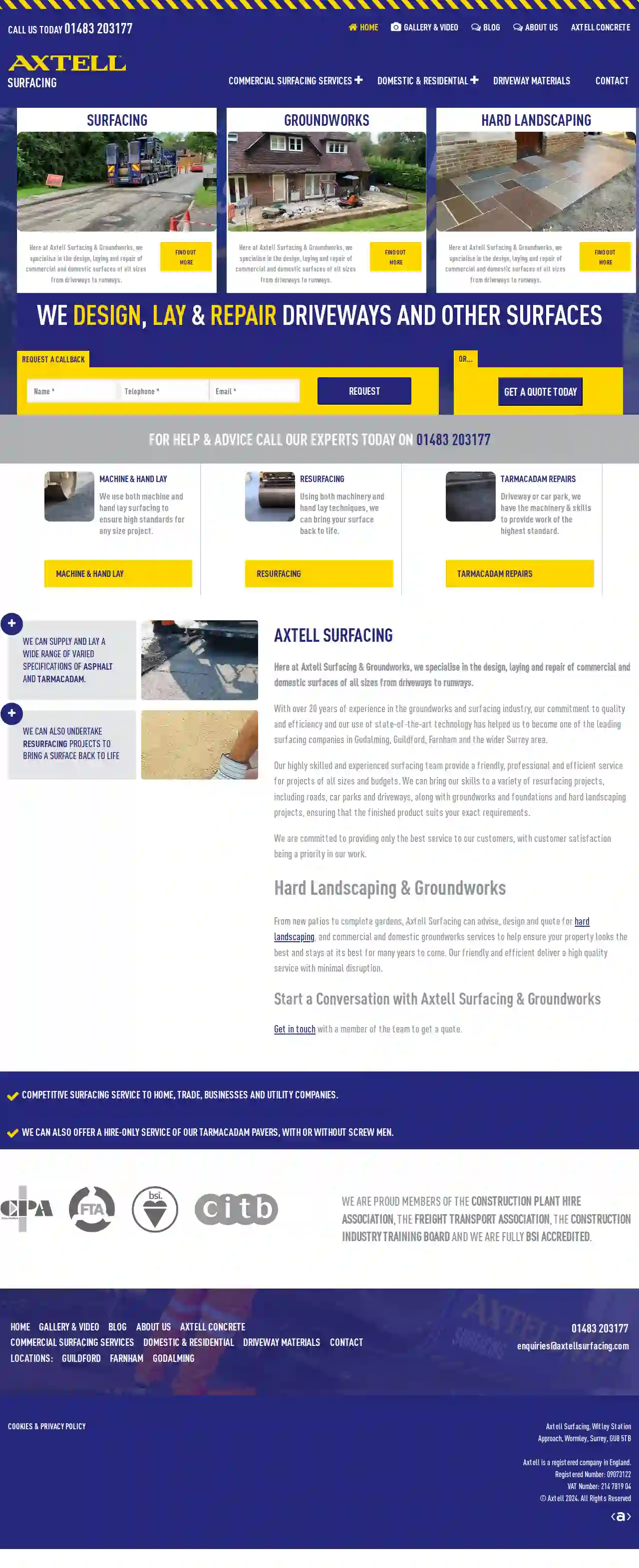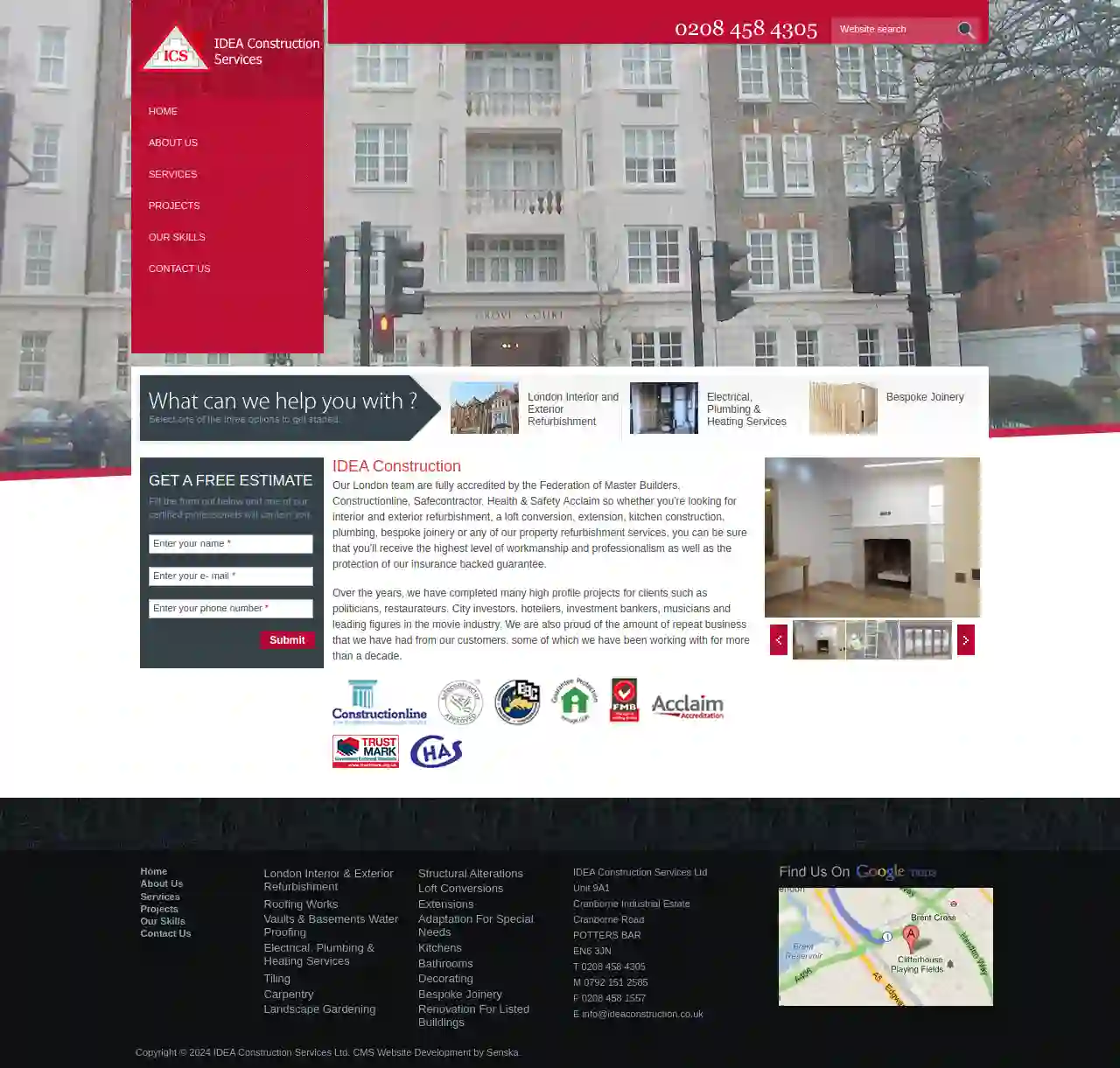Excavation Contractors Dollis Hill
Top 10 Trenching Services in Dollis Hill
Receive up to 3 Excavation Company Near Me quotes for your project today! Compare profiles, reviews, accreditations, portfolio, etc... and choose the best deal.

Axtell Surfacing & Groundworks
53 reviewsAxtell Surfacing, Witley Station Approach, Wormley, Surrey, GU8 5TB, GBAxtell Surfacing & Groundworks Here at Axtell Surfacing & Groundworks, we specialise in the design, laying and repair of commercial and domestic surfaces of all sizes from driveways to runways. With over 20 years of experience in the groundworks and surfacing industry, our commitment to quality and efficiency and our use of state-of-the-art technology has helped us to become one of the leading surfacing companies in Godalming, Guildford, Farnham and the wider Surrey area. Our highly skilled and experienced surfacing team provide a friendly, professional and efficient service for projects of all sizes and budgets. We can bring our skills to a variety of resurfacing projects, including roads, car parks and driveways, along with groundworks and foundations and hard landscaping projects, ensuring that the finished product suits your exact requirements. We are committed to providing only the best service to our customers, with customer satisfaction being a priority in our work. Hard Landscaping & Groundworks From new patios to complete gardens, Axtell Surfacing can advise, design and quote for hard landscaping, and commercial and domestic groundworks services to help ensure your property looks the best and stays at its best for many years to come. Our friendly and efficient deliver a high quality service with minimal disruption.
- Services
- Why Us?
- Accreditations
- Gallery
Get Quote
Connell Oliver & Son Ltd
3.938 reviewsZanrose House, Perivale Park, Horsenden Lane South, Greenford, UB6 7RH, GBOliver Connell & Son: Specialist Subcontractors in West London Established in 1974 by Oliver and Pat Connell, Oliver Connell & Son began as a small family-run groundworks company. Over the years, they have consistently grown and thrived, becoming one of the most established RC Frame and Groundworks subcontractors in London, with an annual turnover exceeding £150 million. Oliver Connell & Son Ltd has left a significant mark on the southeast landscape. From the iconic ‘Eagle’ building on London's City Road and Fetter Place in the City, showcasing the high architectural finish achieved with their 13-story panoramic glass lifts, to the Marriott Lingfield Hotel, the recently opened Cambridge Ibis Hotel, and countless residential units throughout the region, their work is evident. Oliver Connell & Son offers clients suitable construction solutions thanks to their in-house labor, formwork, plant, and machinery, all supplied from their depot and head office located near central London.
- Services
- Why Us?
- Testimonials
- Gallery
Get Quote
Naze Tower
4.6Naze Tower, The Naze, Old Hall Lane, Walton-on-the-Naze, CO14 8LE, GBThe Naze Tower The Naze Tower is an historic 86ft landmark and unique visitor attraction situated on an attractive stretch of coastline at Walton-on-the-Naze, Essex. Over eight floors it houses an art gallery with three exhibitions a year, a museum on the Tower and Naze, café and a roof viewing platform with spectacular panoramic views. The best way to experience the Tower is to visit – hope to see you soon! Become a Member Ideal for locals, regulars, enthusiasts and art lover’s who want to visit all of the exhibitions and support this special heritage landmark. Benefits include unlimited visits for a calendar year, free guest ticket allowance, invite to the Exhibition Private Views and the Annual Friends Party & BBQ. Family Days The Naze is the perfect place for a fun packed day out with the Family. Climb the Tower, enjoy the museum and art and take in the amazing views. Discover the outdoors – The Naze is a heritage park. Great for picnics, kite flying, trails and the beach – go sharks tooth hunting too! Art & History For art lovers we have three diverse exhibitions to enjoy that celebrate the talent of East Anglian artists from well known artists to newcomers on the art scene. All the work is for sale so you can even take your favourite home! For history lovers we have our museum floor with the history of the Tower and artefacts from the Naze. Climbing its victorian spiral staircase takes you back in time as you experience this unique grade 2* listed maritime landmark. Tower Social The Naze Tower is a very friendly place, it is very much part of the community of Walton on the Naze. Lots of locals and visitors use our tea rooms to meet up and socialise with friends and family, including the four legged ones!
- Services
- Why Us?
- Gallery
Get Quote
ALSTRUCT Ltd
52 reviewsLondon, GBAbout Alstruct Alstruct is your one-stop solution for all your construction needs. With a commitment to excellence and a passion for precision, we offer a diverse range of specialized services to transform your vision into reality. Our expertise encompasses a wide spectrum of construction services: Ground Works, Drainage, Landscaping, and Paving: We believe in setting a solid foundation for success. Whether it’s designing effective drainage solutions, crafting captivating landscapes, or creating impeccably paved surfaces, we’re here to lay the groundwork for your dreams. Renovations, Fit-Outs, Painting, and Decorations: Your space should reflect your unique style and vision. Our team specializes in breathing new life into existing spaces, customizing interiors to your exact specifications, and adding the perfect finishing touches with expert painting and decorations. Reinforced Concrete Frames, Basements & Retaining Walls, Staircases: Structural integrity is at the core of our construction philosophy. Our expertise in reinforced concrete frames, basements, retaining walls, and intricate staircases ensures the durability and stability of your project. Brickwork & Stonework, Tiling: Our craftsmen possess an innate talent for the artistry of brickwork, stonework, and precision tiling. They create timeless and breathtaking finishes that enhance the beauty and elegance of your projects. Our Vision We place customer satisfaction and the quality at the heart of everything we do. Our clients’ dreams and aspirations for the best quality are our guiding stars. We listen, we understand, and we bring their visions to life in a way that exceeds their wildest expectations.
- Services
- Why Us?
- Gallery
Get Quote
TMR Mini Digger & Driver Hire Luton
55 reviews16 Eldon road, Luton, LU4 0AU, GBAbout us TMR Mini Digger & Driver Hire Luton is a Bedfordshire-based, family-run business with years of experience in groundwork and excavation. We offer a range of diggers and attachments for both domestic and commercial projects. TMR Mini Digger & Driver Hire Luton is a trusted excavation service provider based in Luton, Bedfordshire. Our family-run business has years of experience in groundwork and operating diggers, and we are committed to delivering high-quality and reliable services to our clients. We have built an excellent reputation over the years, thanks to our dedicated team of skilled operators and state-of-the-art equipment.We cater to both domestic and commercial clients, including local builders, in Luton and the surrounding areas. Our range of services includes garden levelling, foundation excavation, driveway dig-outs, tree root removal, and more. We have 1-ton micro diggers for narrow access and up to 3-ton diggers for larger projects, ensuring that we can handle any excavation job, no matter the size. TMR Mini Digger & Driver Hire Luton, we pride ourselves on our commitment to providing a personalized service that meets the unique requirements of our clients. Our skilled operators work closely with you to understand your specific needs, ensuring that we deliver efficient and cost-effective solutions that meet or exceed your expectations. We also offer additional attachments such as dumpers and concrete breakers to get the job done efficiently. Our equipment is regularly maintained to ensure that it is in top condition, minimizing downtime and ensuring that we can complete your project on time and within budget. At TMR Mini Digger & Driver Hire Luton, no job is too big or small. We approach each project with the same level of commitment and dedication, ensuring that our clients are always satisfied with our services. Our goal is to provide high-quality excavation services that are reliable, efficient, and cost-effective. In conclusion, if you are looking for a trusted and reliable excavation service provider in Luton and the surrounding areas, TMR Mini Digger & Driver Hire Luton is a perfect choice. Contact us today to discuss your excavation needs and get a quote.
- Services
- Why Us?
- Gallery
Get Quote
1st Call Drain Clearance & Technical Services - Brentford
Unit 11Brook Lane Business CentreBrook Lane NorthBrentford, Brentford, TW8 0PP, GBDrainage Company in Harrow, Ealing & Central London Issues with your drainage system means disruption to your business or your home. At 1st Call Drain Clearance & Technical Services, we work 24/7 as expert drainage contractors for Central London, Harrow, Ealing, Brentford and surrounding areas to get you back on track. When you need an accredited drainage company to help you put drainage problems right, make us your first call. Blocked drains stopping your business operations? Or do you need drain cleaning services to get rid of odours and restore proper flow to your system? Whatever you need and whichever sector you operate in, we’re here to help with commercial and residential drainage issues. Our full range of drainage services includes: Unblocking Drains Unblocking of Sewers Unblocking of Sinks & Toilets CCTV Drainage Surveys Drain Re-lining Drain Excavation Drain & Pipe Clearance Drain Pressure Jetting Emergency Drainage Sump Pumps for Drainage Rat Blocker & Rodent Control Commercial Drainage We provide efficient services and our knowledgeable team of engineers will help get to the bottom of any drainage problem you’re having – we’ve got the right tools and the right skills to tackle every issue. Call any time of the day or night for your local, responsive drainage company and we’ll help to put things right on your property.
- Services
- Why Us?
- Accreditations
- Testimonials
- Gallery
Get Quote
Idea Construction Services Ltd
Unit 9A1 Cranborne Industrial Estate, Cranborne Road, Unit 9A1 Cranborne Industrial Estate Cranborne Road, POTTERS BAR, EN6 3JN, GBIDEA Construction: Your Trusted London Refurbishment Partner IDEA Construction is a leading London-based construction company specializing in a wide range of refurbishment and building services. We are fully accredited by the Federation of Master Builders, Constructionline, Safecontractor, and Health & Safety Acclaim, ensuring the highest standards of workmanship and professionalism. Our commitment to quality is reflected in our insurance-backed guarantee, providing you with peace of mind throughout your project. We have a proven track record of delivering exceptional results for a diverse clientele, including politicians, restaurateurs, City investors, hoteliers, investment bankers, musicians, and leading figures in the movie industry. Our dedication to customer satisfaction is evident in the high volume of repeat business we receive, with some clients trusting us for over a decade. IDEA Construction began as a small business in 2003 and has grown steadily, becoming a limited company in 2006. In 2009, we expanded our services by opening a bespoke joinery workshop, allowing us to reduce reliance on subcontractors, maintain high standards, and expedite project completion. As we celebrate our tenth anniversary, we remain committed to providing exceptional construction services in London. Our team of skilled professionals is dedicated to delivering projects on time and within budget, exceeding your expectations at every stage.
- Services
- Why Us?
- Accreditations
- Gallery
Get Quote
Newglen Construction Ltd.
124 Gelvin Road, Co L. Derry, Derry, BT47 4QY, GBNewglen are an established Groundworks and Demolitions contractor offering our clients full package solutions in both modular developments and traditional building methods. Our experienced management teams and directly employed skilled workers, together with our modern fully owned and serviced plant have allowed us to complete a wide variety of projects to the highest standard, on time and within budget.
- Services
- Why Us?
- Testimonials
- Gallery
Get Quote
Mini Digger Plant Hire Cheshunt
52 reviewsCHESHUNT, EN8 9EJ, GBCRT Groundwork & Mini Digger Hire is a family run business offering an extensive range of professional, friendly mini digger services to residential home owners, commercial contractors and the building trade throughout Hertfordshire, Essex and London, all at very competitive prices. We are able to negotiate set prices for specific projects or you may wish to simply hire a man with a digger on a daily rate basis. Our machines are well maintained at all times as we are not only the operators but also the owners. Depending on your project requirements we are able to source and hire any other plant machinery you may need from our extensive list of reliable contacts built up over the last thirteen years, giving you peace of mind and the satisfaction of knowing you have the highest quality available. We hope you like our new website.
- Services
- Why Us?
- Gallery
Get Quote
Shanahan Contracting Ltd
51 reviewsLondon, GBShanahan Contracting: Your Trusted Partner for Drain, Waste Management & Sewerage Services Shanahan Contracting is a leading provider of drain, waste management, and sewerage services across the South East region. We are an accredited and licensed waste carrier with over 20 years of experience in both commercial and domestic sewerage systems. Our commitment to quality, professionalism, and customer satisfaction has made us a trusted name in the industry. We offer a comprehensive range of services, including: Oil interceptor cleaning CCTV surveys Liquid waste haulage Cesspit and septic tank emptying Drain and gully cleaning Drain repairs and drain excavation We understand that emergencies can happen at any time, which is why we offer 24/7 emergency support. Our team is available to respond quickly and efficiently to any urgent needs you may have. At Shanahan Contracting, we believe in providing competitive pricing and a high-quality service, regardless of the size of your project. We are dedicated to exceeding your expectations and ensuring your complete satisfaction.
- Services
- Why Us?
- Gallery
Get Quote
Over 13,059+ Excavation Companies on our directory
Our excavation companies operate in Dollis Hill & beyond!
ExcavationHQ has curated and vetted the Best Excavation Businesses in Dollis Hill. Find the most trustworthy pro today.
Frequently Asked Questions About Excavation Contractors
- Project Size and Scope: Larger, more complex excavations naturally take longer.
- Soil Conditions: Rocky or challenging soil types can slow down progress.
- Site Accessibility: Limited access might require more time for maneuvering equipment and hauling materials.
- Weather: Inclement weather can cause delays.
- Permitting and Inspections: Waiting for permits or inspections can extend the timeline.
- Sloped Property: Your property has a significant slope, making it prone to soil erosion or landslides.
- Creating Usable Space: You want to level off a sloped area to create a flat surface for patios, gardens, or other outdoor spaces.
- Preventing Damage: Erosion is threatening existing structures, driveways, or walkways.
- Landscaping Features: You're incorporating tiered gardens, raised beds, or other landscaping elements requiring soil retention.
- Clear the Area: Remove any obstacles, including vehicles, outdoor furniture, landscaping features, or structures, from the excavation zone and surrounding area.
- Mark Existing Features: Identify and mark underground utilities, septic tanks, sprinkler systems, or other buried elements you want to protect.
- Protect Landscaping: Use tarps or fencing to shield trees, shrubs, gardens, or other landscaping elements from damage.
- Provide Access: Ensure the excavation contractor has clear access to the work area, including gates wide enough for equipment.
- Discuss Logistics: Coordinate with the contractor regarding parking arrangements, material delivery, and any special instructions or concerns you might have.
What is the difference between cut and fill excavation?
Cut: Involves excavating soil from an area where the existing grade is higher than the desired grade.
Fill: Refers to using the excavated soil ('cut' material) to raise the grade in an area where the existing grade is lower than desired.
This method minimizes the need to import or export soil, reducing costs and environmental impact. It's commonly used for site preparation, road construction, and landscaping.
How long does an excavation project take?
How do I know if I need a retaining wall?
How do I prepare my property for excavation?
What is the difference between cut and fill excavation?
Cut: Involves excavating soil from an area where the existing grade is higher than the desired grade.
Fill: Refers to using the excavated soil ('cut' material) to raise the grade in an area where the existing grade is lower than desired.
This method minimizes the need to import or export soil, reducing costs and environmental impact. It's commonly used for site preparation, road construction, and landscaping.
How long does an excavation project take?
- Project Size and Scope: Larger, more complex excavations naturally take longer.
- Soil Conditions: Rocky or challenging soil types can slow down progress.
- Site Accessibility: Limited access might require more time for maneuvering equipment and hauling materials.
- Weather: Inclement weather can cause delays.
- Permitting and Inspections: Waiting for permits or inspections can extend the timeline.
How do I know if I need a retaining wall?
- Sloped Property: Your property has a significant slope, making it prone to soil erosion or landslides.
- Creating Usable Space: You want to level off a sloped area to create a flat surface for patios, gardens, or other outdoor spaces.
- Preventing Damage: Erosion is threatening existing structures, driveways, or walkways.
- Landscaping Features: You're incorporating tiered gardens, raised beds, or other landscaping elements requiring soil retention.
How do I prepare my property for excavation?
- Clear the Area: Remove any obstacles, including vehicles, outdoor furniture, landscaping features, or structures, from the excavation zone and surrounding area.
- Mark Existing Features: Identify and mark underground utilities, septic tanks, sprinkler systems, or other buried elements you want to protect.
- Protect Landscaping: Use tarps or fencing to shield trees, shrubs, gardens, or other landscaping elements from damage.
- Provide Access: Ensure the excavation contractor has clear access to the work area, including gates wide enough for equipment.
- Discuss Logistics: Coordinate with the contractor regarding parking arrangements, material delivery, and any special instructions or concerns you might have.